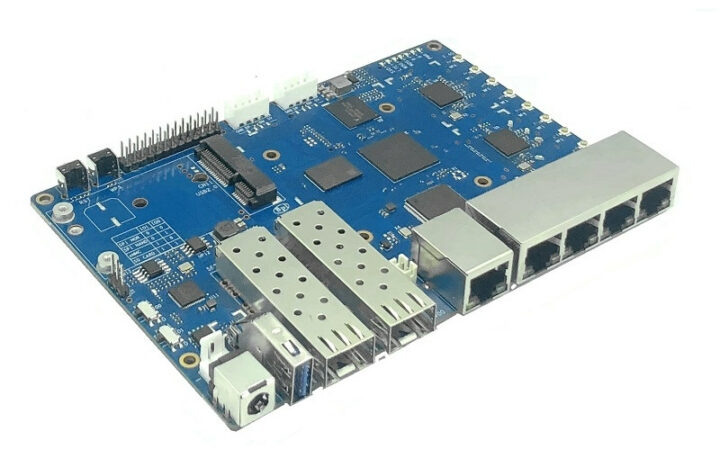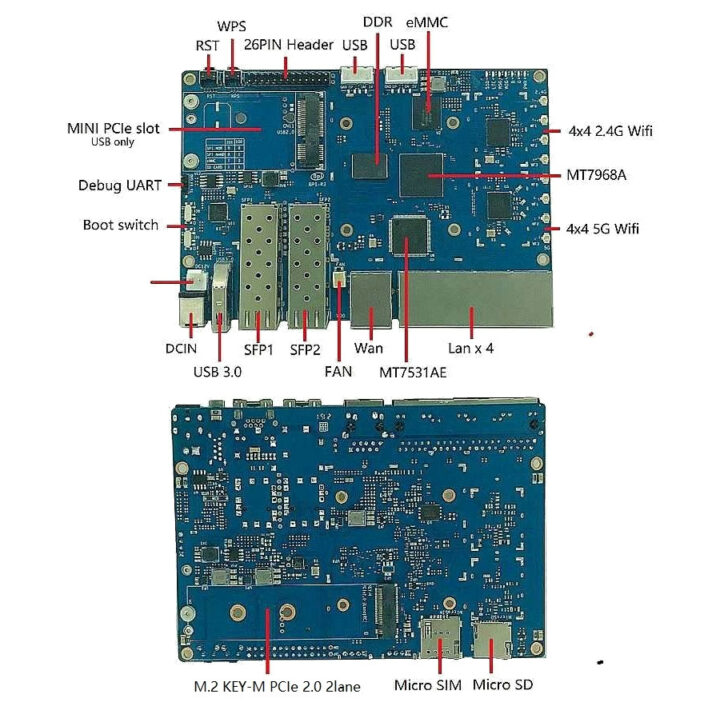I first noticed the MediaTek MT7986 WiFi router processor in Linux 5.17 changelog. MT7986 is the codename for MediaTek Filogic 830 quad-core Cortex-A53 processor designed for Wi-Fi 6/6E routers with up to 6 Gbps bandwidth, and two 2.5Gbps Ethernet interfaces.
Banana Pi BPI-R3 is a router board based on Filogic 830/MT7986A that offers an upgrade to the company’s Banana Pi BPI-R2 board powered by a MediaTek MT7623A quad-core Cortex-A7 processor or even the Banana Pi BPI-R64 board based on a MediaTek MT7622 dual-core Arm Cortex-A53 SoC.
Banana Pi BPI-R3 specifications:
- SoC – MediaTek MT7986A (Filogic 830) quad-core Arm Cortex A53 processor with hardware acceleration engines for Wi-Fi offloading and networking
- System Memory – 2GB DDR RAM
- Storage – 8GB eMMC flash, MicroSD card socket, support for M.2 NVMe SSD
- Networking
- 2x 2.5GbE SFP cages, 5x Gigabit Ethernet ports (1x WAN + 4x LAN) via MT7531AE 7-port switch
- WiFi 6 4×4 2.4GHz WiFi via MT7975N
- WiFi 6 4×4 5GHz Wifi via MT7975P
- 8x u.FL antenna connectors
- USB – 1x USB 3.0 Type-A ports, 2x USB 2.0 headers
- Expansion
- Mini PCIe slot with USB signals only + MicroSIM card slot
- M.2 KEY-M PCIe interface (2-lane PCIe 2.0)
- 26-pin GPIO header
- Debugging – Debug UART header for serial console
- Misc – Reset and WPS buttons, fan header, boot switch
- Power Supply – Via DC jack or 2-pin header
- Dimensions – 100.5 x 148mm
- Weight – 200 grams
Banana Pi says the board can be used as an “internet service router”, a wireless router, a repeater, a home security gateway, an home automation gateway, a NAS device (using an M.2 to 5x SATA adapter), as well as other network and communication applications. Banana PI provides an OpenWrt 21.02 image with Linux 5.4 for the board which you can find, together with the source code and other technical information, on the wiki.
Besides the OpenWrt image provided by Banana Pi, the BPI-R3 board has also very recently been added to mainline OpenWrt as noted in the comments section.
You’ll also notice an SFP to RJ45 adapter in the thumbnail or video above. Note while there are many of those available online, they may not all work as expected, and the ones most likely to work can be pricey (around $500). The good news is that Banana Pi BPI-R3 apparently works with a cheaper SFP to RJ45 adapter sold for under $30 on Aliexpress.
Banana Pi BPI-R3 board can be purchased for $94 on Aliexpress. Additional information may be found on the product page.
[Updated: The post was initially published on March 21, 2022, and updated following the launch on Aliexpress]

Jean-Luc started CNX Software in 2010 as a part-time endeavor, before quitting his job as a software engineering manager, and starting to write daily news, and reviews full time later in 2011.
Support CNX Software! Donate via cryptocurrencies, become a Patron on Patreon, or purchase goods on Amazon or Aliexpress






